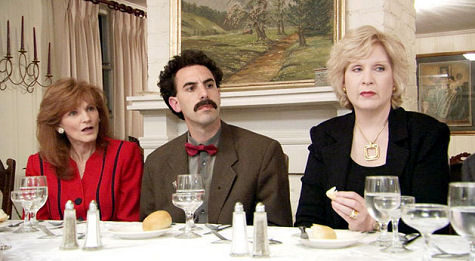Snap Judgment
Just as Burt Lancaster‘s Ernst Janning character finally spills his true thoughts at the end of Judgment at Nuremberg, it is time after days of sober reflection to speak of the Borat playdate scale-back that was confirmed by 20th Century Fox last Wednesday. Instead of opening Sacha Baron Cohen‘s rollicking comedy on the previously decided-upon 2000 screens on 11.3, Fox will now start with an 800-screen debut and then bump the run up to 2,200 screens the following weekend (i.e., 11.10).

My basic feeling is that Borat: Cultural Learnings of America for Make Benefit Glorious Nation of Kazakhstan is one of the most live-wire concoctions to come along in years — as much of an essential American comedy as Preston Sturges‘ Sullivan’s Travels — and an absolute must-see for anyone with a pulse. But it’s not especially embracable or familiar-feeling, truth be told. It’s clever, witty, often hilarious in a dumb-ass way…but sometimes it’s more astonishing than anything else.
I was a bit more amazed by Borat than in love with it, although I’m recommending it to everyone I see. You can’t not see it any more than a half-aware moviegoer could avoid seeing Dr. Strangelove when it came out in early ’64. To not see Borat is to say to yourself or your friends on some level, “I am dead…I am out of the ’06 loop.”
< ?php include ('/home/hollyw9/public_html/wired'); ?>
The truth, I believe, is that red-state types (I’m sorry for ignoring the recently evolved p.c. decision that there’s no such thing as a red-state mentality…sorry, A.O. Scott!) may not find it as outrageous-funny as blue-state urbans. It’s a silly-goofy comedy, but Borat is fundamentally a satire about rural American values. It’s absurdist but snide. If nothing else, the Pentacostal conversion scene alone (which is more of a mind-blower than hah-hah “funny”) makes this fairly obvious.
Fox’s cutback happened, obviously, because the Borat awareness among regular Joe Schmoes wasn’t where it needed to be to support a big 2000-screen debut. I wrote about the sluggish tracking situation ten days ago (on 10.19). That 10.25 L.A. Times story by Josh Friedman and Lorenza Munoz said that a National Research Group tracking survey issued last Monday “showed that 27% of respondents were aware of Borat, well behind two competitors” — Disney’s The Santa Clause 3: The Escape Clause and DreamWorks’ Flushed Away” — opening the same weekend.

Sacha Baron Cohen
This may seem like an extreme analogy to some, but the answer to Borat‘s apparent low awareness, I believe, lies in Ernst Janning’s statement about the proverbial claim that average Germans didn’t know what the National Socialist government was up to in the 1930s and early ’40s. “Maybe we didn’t know the details,” he declares, “but if we didn’t know, it was because we didn’t want to know!” Same thing here, I believe, and the root factor, as in Nazi Germany, is about tribal persuasions and inclinations and snap judgments.
I’m not saying average Americans are Nazis, for heaven’s sake…calm down. I’m saying they make gut-level decisions about movies they want to see based on deep-down primal factors. Like you or me, like anyone.
Average Joes (and I mean the generally overweight slow-on-the-pickup types…the “late adopters”) are aware of Borat, all right — how could they have missed the hoopla out of Cannes and Toronto, the internet buzz, that recent Entertainment Weekly cover? But somewhere deep down they’ve considered Cohen’s appearance — rug-trader moustache, Middle-Eastern ethnicity, extremely geeky — along with the arch, deliberately “impersonal”, somewat anti-emotional attitude of an outsider-hipster who’s aiming his jokes at those hip enough to get where he’s coming from, and they’re saying to themselves, “This guy’s not me, and he’s not trying to talk to me — he wants me to get into him.”
In other words they’re taking one look, they’re sizing him up…and they “don’t want to know.” Instinctually. That’s what’s going on with Joe Sixpack, with older rurals, with lazy boomers, with the hundreds of thousands of shallow young girls who laugh too loudly when they sit together at Starbucks. The only people who are naturally into him are educated (or at least curious), ahead-of-the-curve (or abreast-of-the-curve) urbans. That’s where the 27% awareness is from.

Of course, all the resistors have to do is see the damn movie and everything will change. They’ll mostly laugh in an “oh my God!” sort of way, and they’ll tell their friends and Borat will be on its way to wherever, on its own speed. That’ll probably start to happen when the 800-theatre break happens next Friday. I know it’ll do well in most cities, but one should never underestimate red America’s xenophobia — the deep-seated unwillingness to consider an exotic attitude or mentality. They like what they like if the movie/record/TV show reaches out and talks to them, and if it doesn’t….later, dude.
In short, Borat is largely a satire of American rubes, and the commercial reception that awaits should, I feel, be read as a referendum on the American character circa 2006.









